Last week, more than 30 Irish contractors, members of the Association of Farm Contractors in Ireland (FCI) took part in an information trip to Europe that included a visit to the German contractors’ association DeLuTa conference and exhibition event, followed by a visit to the Claas factory in Harsewinkel. They then travelled to Holland to visit the offices of the Dutch contractors’ association Cumela after which they visited Dutch contractors.
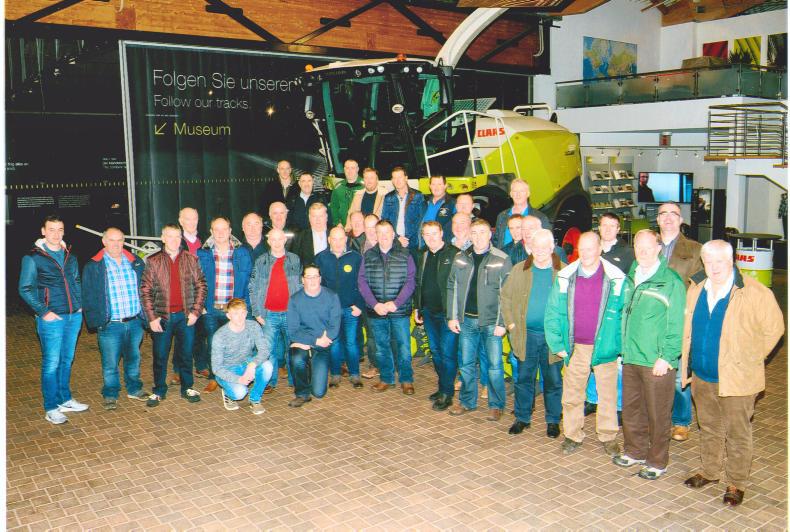
FCI Contractor members who visited the Claas factory in Harsewinkel following the visit to the DeLuTa contractor show in Bremen, Germany.
German contractors are significantly involved in all aspects of agricultural production from tillage cropping to forage harvesting, slurry and fertilisation management to green area management. The big areas of activity now are slurry and forage crops, which contractors dominate for reasons of scale and efficiency.
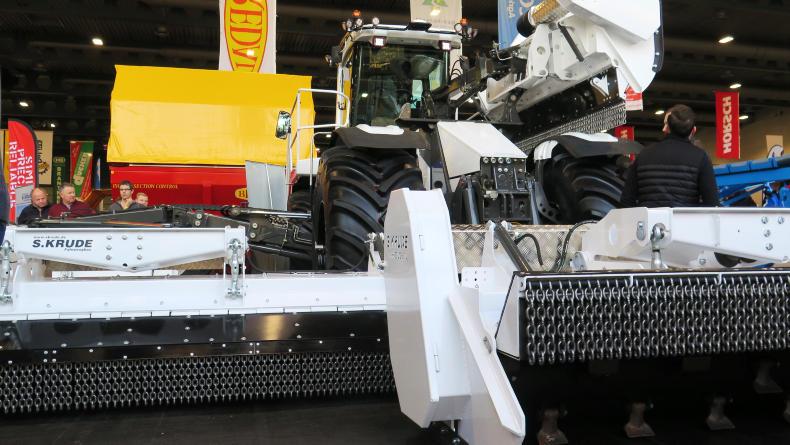
German contractors are big users of flail choppers for clearing rough ground and roadway maintenance, where they have annual contracts with local authorities. This Krude (www.skrude.de) built machine was based around a Claas Cougar self-propelled mower with a strengthened chassis and arm structure to carry the heavier flail choppers. It is owned by the Westhoff farm contractor business.
Forage crop harvesting includes a major harvesting and transport input in the biogas industry which accounts for a significant proportion of the German maize crop. German biogas digesters are typically fed with a mix of silage, grass and/or maize, beet and animal slurry.
High capacity
The DeLuTa event mostly featured high-capacity silage and slurry machinery. Slurry and manure management are huge areas of German contractor activity and that was noticeable by the size of the machines present. There were a number of self-propelled tankers on view as well as a significant number of three-axle large tankers.
The levels of specification on these machines are far higher than typically found in Ireland and with prices to match. Ground compaction is important and many of the machines were fitted with variable tyre pressure management systems. Nutrient management is also important and there were large numbers of systems on show as well as computer-based field management systems for management of slurry systems. There were some interesting balloon systems available to all trailers to be used for the transport of silage crops on one run and return with a full load of slurry from an inflated balloon storage that filled the capacity of the trailer, without contaminating the next load of silage.
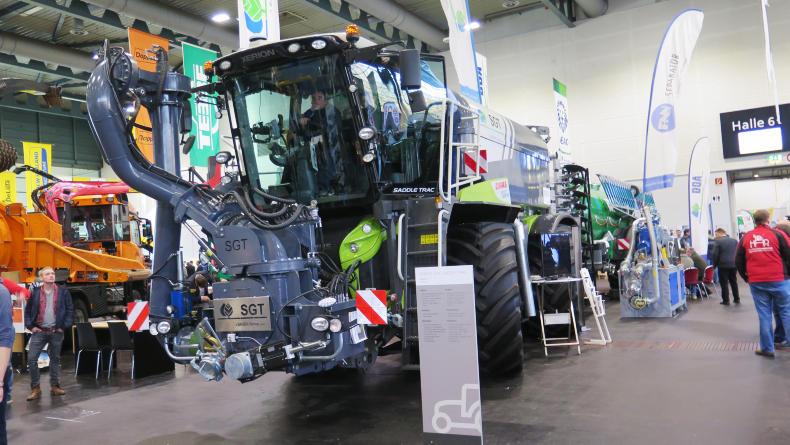
Slurry handling is a major operation for Germany contractors and there were many large self-propelled unit on show at the DeLuTa event, including this giant from SGT built around a Claas Xerion tractor.
A different feature of German contracting is the fact that there is only one type of diesel available, a white road-type diesel sold to farmers and contractors at the full road diesel price. Farmers are allowed by get a tax rebate on diesel usage for their farm on a quarterly or annual basis.
Farm contractors are not eligible for the rebate, which is currently 23c/l. For this reason, many German contractors include a diesel charge on their invoices to farming customers. The farmers can then available of the rebate based on the invoiced purchase of diesel from the contractor.
Demand
Labour shortages are also a significant problem for contractors in Germany. Increasing number of drivers are being sought from Bulgaria and Romania to satisfy the demand. Contractors do not consider this to be an ideal situation as there are language barriers to deal with, and farming customers are not happy either.
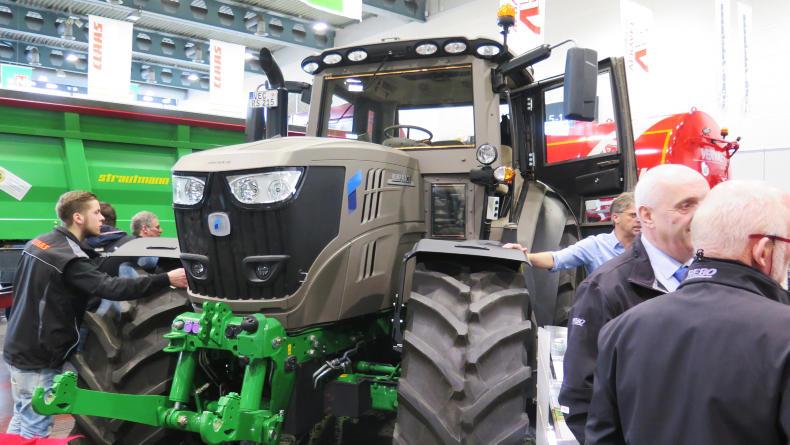
German contractors often have additional work in restoring historic war areas. John Deere dealer Rebo joined with Rheinmetall Waffe to show this military specification John Deere 6R tractor with a price tag of in excess of €300,000. The tractor has shielding is designed to meet level 2 of NATO’s STANAG standards, protecting the occupant from bullets and explosive fragments.
The German BLU contractors association has embarked on an educational and promotional campaign to try to get more young people to join the sector. They have run TV and YouTube advertising campaigns to promote the sector.
They have also put in place a formal training programme with agricultural colleges. This consists of block release training where state funding provides for the college block portion of the training, while the contractor pays for work experience period.
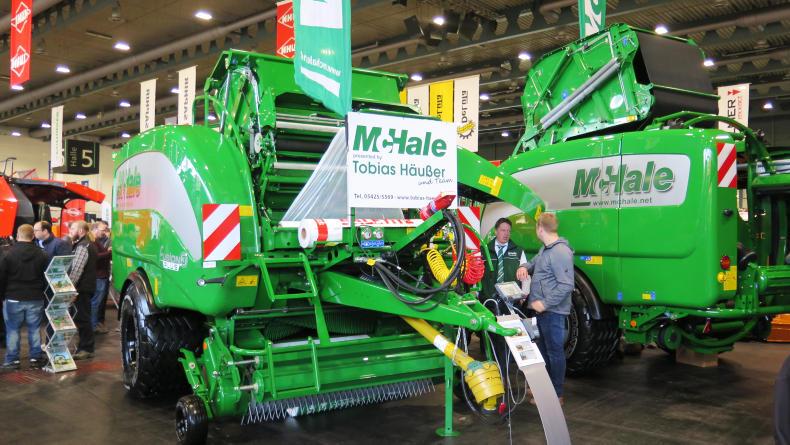
McHale Engineering was the only Irish manufacturer represented at DeLuTa where the McHale Fusion is popular with German contractors.
For those machine operators who want further training, there is the opportunity to get a masters qualification by attending a three-to-four-month intensive course, which the contractor may pay for with a condition that the operator must stay with that contractor’s business for an agreed number of years.
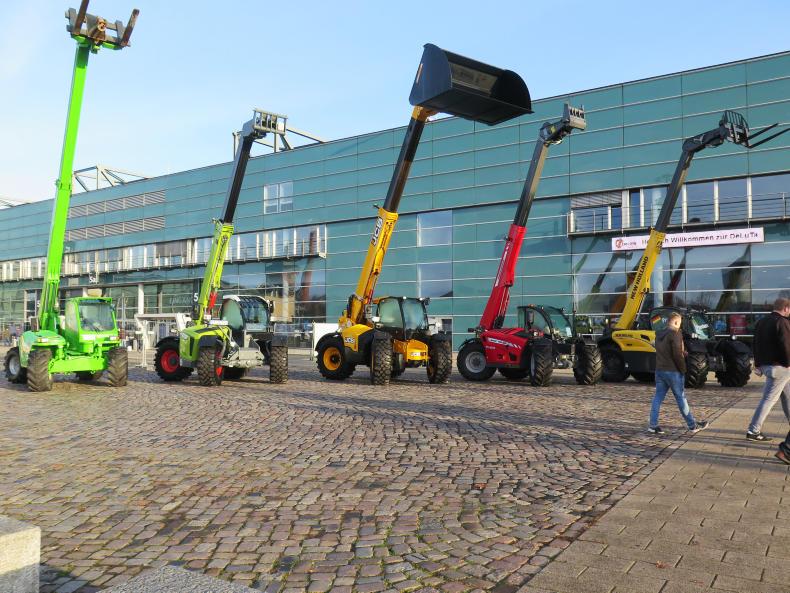
The ninth DeLuTa conference and exhibition event held for contractors and their employees in Bremen attracted an attendance of over 12,000 people over two days. This is a practical bi-annual event, with a mix of information seminars running all day in addition to a significant machinery and suppliers display that included more than supporting 220 trade stands across three large exhibition halls in the centre of Bremen.
Unlike Agritechnica, this is an event for practical contractors to meet others and their supplying industry. The seminars are as important as the exhibitions and each one was well attended to almost capacity. All food, tea, coffee and soft drinks are included in the €52 plus VAT entry price and the first day concluded with a free giant social evening for all present where beer tokens were included with the cover charge.
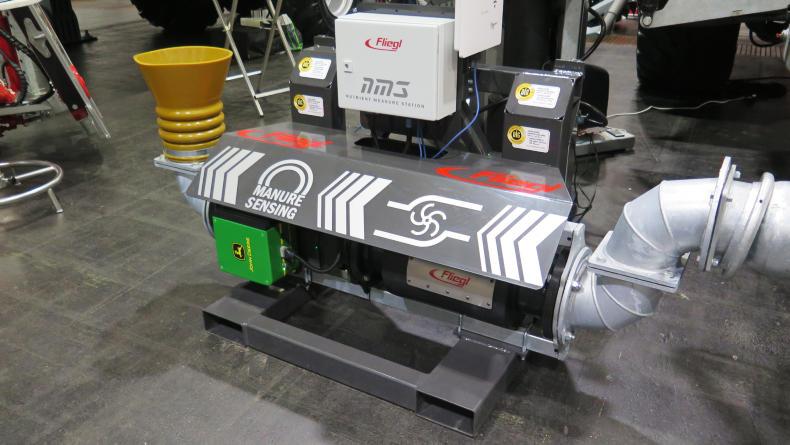
Fliegl teamed up with John Deere in the development of this manure sensing and pumping system that claims to measure nutrients in the slurry as it is being pumped to give a nutrient measure using the John Deere Harvest Lab infra-red monitor unit.
For this event, all exhibitors must first be associate members of the German contractors association, BLU, in order to be eligible to support the event. This event provides significant funding for the German association which has a national membership through five regional associations, of more than 2,000 contractors. BLU was founded in 1997 as a single national representative association and currently employs 18 people in support and advisory roles.
Last week, more than 30 Irish contractors, members of the Association of Farm Contractors in Ireland (FCI) took part in an information trip to Europe that included a visit to the German contractors’ association DeLuTa conference and exhibition event, followed by a visit to the Claas factory in Harsewinkel. They then travelled to Holland to visit the offices of the Dutch contractors’ association Cumela after which they visited Dutch contractors.

FCI Contractor members who visited the Claas factory in Harsewinkel following the visit to the DeLuTa contractor show in Bremen, Germany.
German contractors are significantly involved in all aspects of agricultural production from tillage cropping to forage harvesting, slurry and fertilisation management to green area management. The big areas of activity now are slurry and forage crops, which contractors dominate for reasons of scale and efficiency.

German contractors are big users of flail choppers for clearing rough ground and roadway maintenance, where they have annual contracts with local authorities. This Krude (www.skrude.de) built machine was based around a Claas Cougar self-propelled mower with a strengthened chassis and arm structure to carry the heavier flail choppers. It is owned by the Westhoff farm contractor business.
Forage crop harvesting includes a major harvesting and transport input in the biogas industry which accounts for a significant proportion of the German maize crop. German biogas digesters are typically fed with a mix of silage, grass and/or maize, beet and animal slurry.
High capacity
The DeLuTa event mostly featured high-capacity silage and slurry machinery. Slurry and manure management are huge areas of German contractor activity and that was noticeable by the size of the machines present. There were a number of self-propelled tankers on view as well as a significant number of three-axle large tankers.
The levels of specification on these machines are far higher than typically found in Ireland and with prices to match. Ground compaction is important and many of the machines were fitted with variable tyre pressure management systems. Nutrient management is also important and there were large numbers of systems on show as well as computer-based field management systems for management of slurry systems. There were some interesting balloon systems available to all trailers to be used for the transport of silage crops on one run and return with a full load of slurry from an inflated balloon storage that filled the capacity of the trailer, without contaminating the next load of silage.

Slurry handling is a major operation for Germany contractors and there were many large self-propelled unit on show at the DeLuTa event, including this giant from SGT built around a Claas Xerion tractor.
A different feature of German contracting is the fact that there is only one type of diesel available, a white road-type diesel sold to farmers and contractors at the full road diesel price. Farmers are allowed by get a tax rebate on diesel usage for their farm on a quarterly or annual basis.
Farm contractors are not eligible for the rebate, which is currently 23c/l. For this reason, many German contractors include a diesel charge on their invoices to farming customers. The farmers can then available of the rebate based on the invoiced purchase of diesel from the contractor.
Demand
Labour shortages are also a significant problem for contractors in Germany. Increasing number of drivers are being sought from Bulgaria and Romania to satisfy the demand. Contractors do not consider this to be an ideal situation as there are language barriers to deal with, and farming customers are not happy either.

German contractors often have additional work in restoring historic war areas. John Deere dealer Rebo joined with Rheinmetall Waffe to show this military specification John Deere 6R tractor with a price tag of in excess of €300,000. The tractor has shielding is designed to meet level 2 of NATO’s STANAG standards, protecting the occupant from bullets and explosive fragments.
The German BLU contractors association has embarked on an educational and promotional campaign to try to get more young people to join the sector. They have run TV and YouTube advertising campaigns to promote the sector.
They have also put in place a formal training programme with agricultural colleges. This consists of block release training where state funding provides for the college block portion of the training, while the contractor pays for work experience period.

McHale Engineering was the only Irish manufacturer represented at DeLuTa where the McHale Fusion is popular with German contractors.
For those machine operators who want further training, there is the opportunity to get a masters qualification by attending a three-to-four-month intensive course, which the contractor may pay for with a condition that the operator must stay with that contractor’s business for an agreed number of years.

The ninth DeLuTa conference and exhibition event held for contractors and their employees in Bremen attracted an attendance of over 12,000 people over two days. This is a practical bi-annual event, with a mix of information seminars running all day in addition to a significant machinery and suppliers display that included more than supporting 220 trade stands across three large exhibition halls in the centre of Bremen.
Unlike Agritechnica, this is an event for practical contractors to meet others and their supplying industry. The seminars are as important as the exhibitions and each one was well attended to almost capacity. All food, tea, coffee and soft drinks are included in the €52 plus VAT entry price and the first day concluded with a free giant social evening for all present where beer tokens were included with the cover charge.

Fliegl teamed up with John Deere in the development of this manure sensing and pumping system that claims to measure nutrients in the slurry as it is being pumped to give a nutrient measure using the John Deere Harvest Lab infra-red monitor unit.
For this event, all exhibitors must first be associate members of the German contractors association, BLU, in order to be eligible to support the event. This event provides significant funding for the German association which has a national membership through five regional associations, of more than 2,000 contractors. BLU was founded in 1997 as a single national representative association and currently employs 18 people in support and advisory roles.








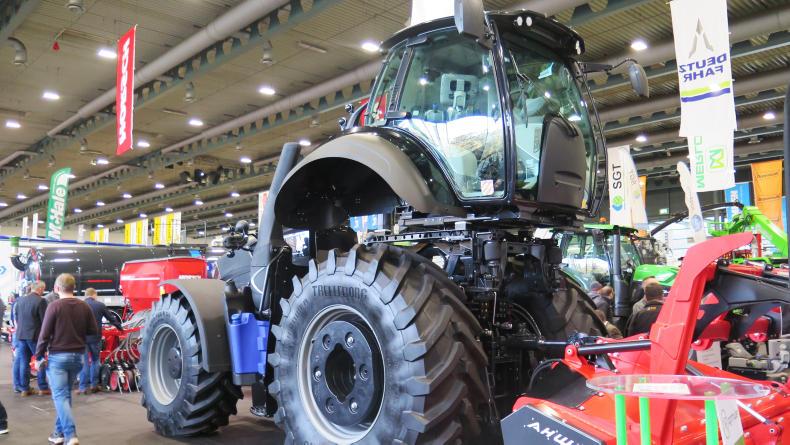




 This is a subscriber-only article
This is a subscriber-only article





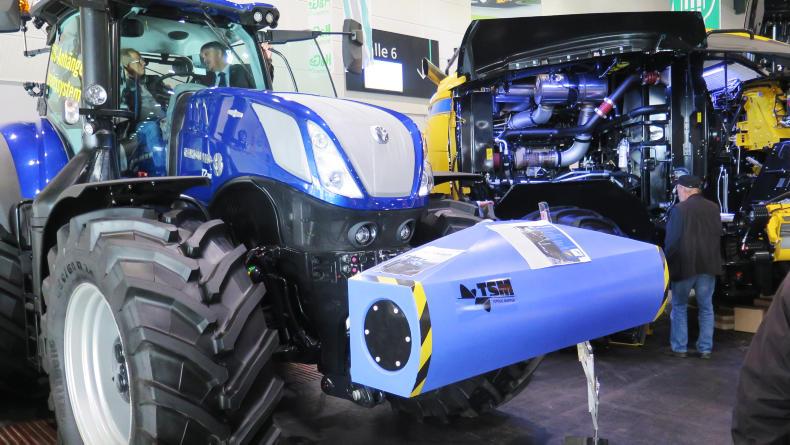
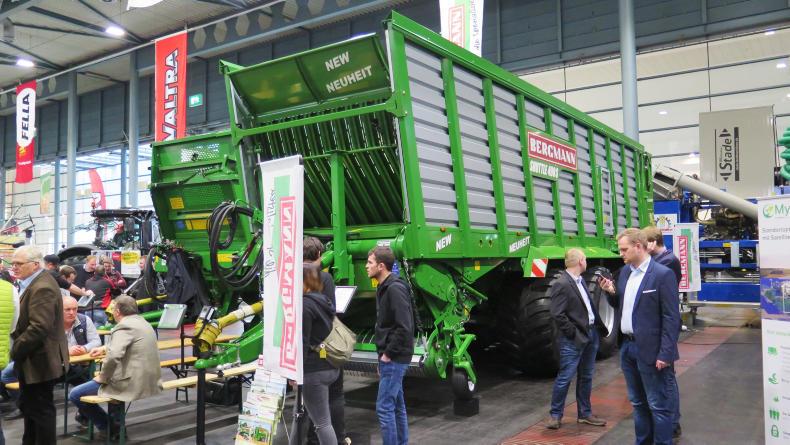


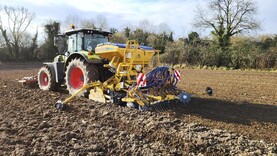
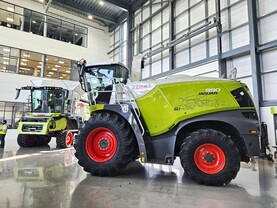
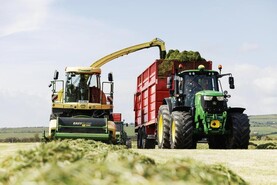

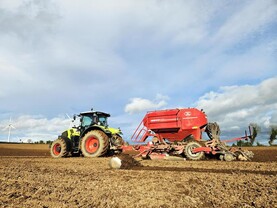
SHARING OPTIONS: